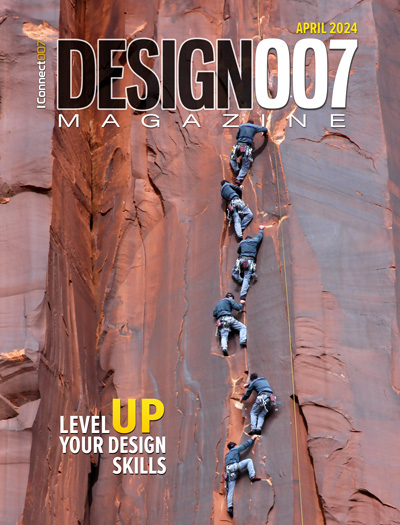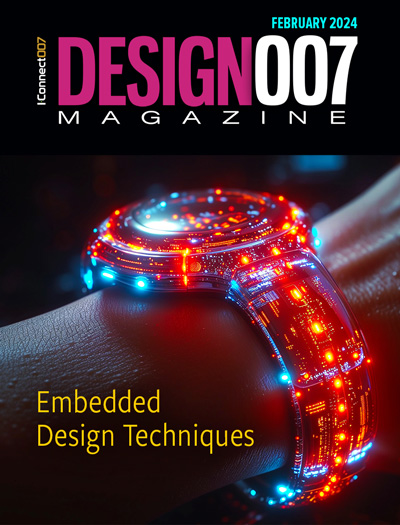-

- News
- Books
Featured Books
- design007 Magazine
Latest Issues
Current Issue
Level Up Your Design Skills
This month, our contributors discuss the PCB design classes available at IPC APEX EXPO 2024. As they explain, these courses cover everything from the basics of design through avoiding over-constraining high-speed boards, and so much more!

Opportunities and Challenges
In this issue, our expert contributors discuss the many opportunities and challenges in the PCB design community, and what can be done to grow the numbers of PCB designers—and design instructors.

Embedded Design Techniques
Our expert contributors provide the knowledge this month that designers need to be aware of to make intelligent, educated decisions about embedded design. Many design and manufacturing hurdles can trip up designers who are new to this technology.
- Articles
- Columns
Search Console
- Links
- Events
||| MENU - design007 Magazine
Q&A With the IPC Design Competition Winner
February 17, 2023 | Andy Shaughnessy, Design007Estimated reading time: 3 minutes
Design engineer Sathishkumar Vijayakumar (aka Sathish Kumar V.) with Tessolve Semiconductor, India, took home top honors in this year’s IPC Design Competition, besting the other four finalists in a rigid-flex design showdown during IPC APEX EXPO.
Unlike last year, no one finished the design completely, so judges graded competitors on what they did finish, as well as criteria such as design decisions they made, and whether they followed electrical and DFM rules. The first heat of the contest began last fall with an original field of 49 competitors, so it’s safe to say that these five finalists represent the cream of the crop.
I asked Sathish to tell us a little about himself and the competition, and what winning this contest means to him as a PCB designer.
Q: Sathish, congratulations on winning the IPC Design Competition for 2023! Why don’t you give us some background about yourself, and how you got into PCB design?
A: Thanks for your wishes, Andy. I am working as a senior PCB design engineer at Tessolve Semiconductor, India. I completed my bachelor’s degree in Electronics and Communication Engineering at Anna University, Chennai. I was happy to start a career in 2014 as a PCB design engineer as my background was in electronics and more specifically, I consider PCB design as an art where I can show my unique skills. At Tessolve, we cater to some of the top semiconductor companies in the world, and I get to work on cutting-edge technologies up front, which makes me feel proud as a PCB designer.
Q: What did you think of the design used in the competition? None of the competitors finished it, whereas last year’s design was considered too easy by a few of those contestants.
A: Yes, the design was quite complicated compared to last year’s design. The design was a rigid-flex PCB with a shape that would fit inside a robotic arm. You can imagine the traces needs to be routed with odd angles for such board shapes, which generally takes more time compared to 45-degree angle traces. It’s a real challenge to complete the routing within the allocated time. I feel it was one of the reasons why none of us were able to complete the design. I started working on items by priority and completed whatever I could following the guidelines. I believe this process helped me.
Remember: "The process is more important than the results. And if you take care of the process, you will get the results.”
Q: What does winning this competition mean to you as a designer?
A: This is one of the greatest milestones in my career and I am very proud for participating in this world competition. Winning this competition gives me more confidence in designing complex PCBs.
I believe that I received the best training and exposure to best practices from my organization while working on different types of PCBs over the years. It certainly helped me a lot with winning this competition. I would like to thank Tessolve, IPC India, and IPC International for helping me participate in the competition. I also thank my family members for being a part of my success.
Q: What advice would you give to other designers considering entering a design contest like this?
A: Nothing is more expensive than losing an opportunity. I would tell all my fellow designers to volunteer themselves and participate in design contests like this. Preparing for such contests itself will make designers learn more about PCB design and it’s certainly going to help their careers. I also think IPC contests create a positive vibe among PCB designers to come forward and participate in upcoming events. I believe that participating in the contests is more important than winning or losing.
Further reading: "Sathishkumar Vijayakuma Wins IPC Design Competition" in the 2023 issue of Real Time with... IPC APEX EXPO Show & Tell Magazine.
Suggested Items
KIC’s Miles Moreau to Present Profiling Basics and Best Practices at SMTA Wisconsin Chapter PCBA Profile Workshop
01/25/2024 | KICKIC, a renowned pioneer in thermal process and temperature measurement solutions for electronics manufacturing, announces that Miles Moreau, General Manager, will be a featured speaker at the SMTA Wisconsin Chapter In-Person PCBA Profile Workshop.
The Drive Toward UHDI and Substrates
09/20/2023 | I-Connect007 Editorial TeamPanasonic’s Darren Hitchcock spoke with the I-Connect007 Editorial Team on the complexities of moving toward ultra HDI manufacturing. As we learn in this conversation, the number of shifting constraints relative to traditional PCB fabrication is quite large and can sometimes conflict with each other.
Standard Of Excellence: The Products of the Future
09/19/2023 | Anaya Vardya -- Column: Standard of ExcellenceIn my last column, I discussed cutting-edge innovations in printed circuit board technology, focusing on innovative trends in ultra HDI, embedded passives and components, green PCBs, and advanced substrate materials. This month, I’m following up with the products these new PCB technologies are destined for. Why do we need all these new technologies?
Experience ViTrox's State-of-the-Art Offerings at SMTA Guadalajara 2023 Presented by Sales Channel Partner—SMTo Engineering
09/18/2023 | ViTroxViTrox, which aims to be the world’s most trusted technology company, is excited to announce that our trusted Sales Channel Partner (SCP) in Mexico, SMTo Engineering, S.A. de C.V., will be participating in SMTA Guadalajara Expo & Tech Forum. They will be exhibiting in Booth #911 from the 25th to the 26th of October 2023, at the Expo Guadalajara in Jalisco, Mexico.
Intel Unveils Industry-Leading Glass Substrates to Meet Demand for More Powerful Compute
09/18/2023 | IntelIntel announced one of the industry’s first glass substrates for next-generation advanced packaging, planned for the latter part of this decade.


